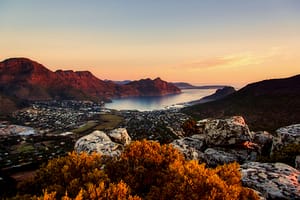Cape Town journey began almost 27,000 years ago, when its first incarnation was as a small seaside settlement inhabited by nomadic hunter-gatherers. This state of affairs continued until 1488, when the Portuguese discovered the area and were swiftly followed by compatriot Vasco de Gama in 1497. Opening up an isolated part of the continent to European influences would change the course of the Cape’s history. In the 16th century, Spanish and Portuguese dominated trade but were surpassed in the 17th century by the Dutch and English, who both wanted greater control. Dutch merchant Jan van Riebeeck arrived in 1652. He asked for slaves to be brought over and more than 60,000 arrived between 1658 and 1807. At the same time, the Dutch authorities began ruthlessly suppressing any opposition, with the indigenousness Khoe people among those imprisoned by the Dutch on Robben Island. The Cape became a Dutch colony and Boer farmers prospered and became empowered. Further arrivals from Scandinavia, Russia, UK, France, Switzerland, Germany, Holland, India, Java and China fuelled Cape Town’s growth but Dutch power was on the wane and the British wrestled control, incorporating the Cape into the British Empire by 1814. With British rule came liberalism and a move for reform – all unpopular with the conservative Dutch population. The gulf between British and Afrikaners widened, all the more so when in 1834, slavery was abolished. Between 1901 and 1948, Cape Town modernised, but new laws and old prejudices separated the population on racial lines. After WWII, apartheid kicked in with segregation extending to education, healthcare and even beach access. During the next few decades, uprisings were frequent and culminated in 1964 with the imprisonment of Nelson Mandela on Robben Island. Although Mandela was released in 1990 and elected president in 1994, the transition from apartheid to majority rule was difficult and today, Cape Town continues to face challenges. Nevertheless, with its African feel and European appearance, Cape Town remains the face of modern South Africa.
Cape Town has an exciting arts and culture scene. In fact, it has the most cultural diversity in South Africa. The people are creative and artistic and there are numerous platforms to showcase their talents, from street walls to exhibition centres. The city is home to a number of talented painters, photographers, musicians and sculptors. Theatre and plays are also big in the city. Rugby, cricket, football and cycling are the main sports of the city. There are numerous festivals and firs around the city in celebration of music, wine, food, flowers, sports, arts, etc. Cape Town is known for its quality of food. From local delicacies to international favourites – they have it all. The residents of Cape Town mostly work in business services, information technology, finance, transport, clothing, wood product manufacturing, fishing and logistics. The city also has a large number of entrepreneurs. The people are friendly and open and they call themselves ‘Capetonians’.

